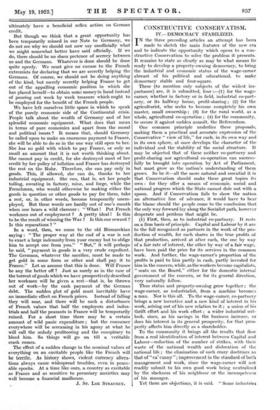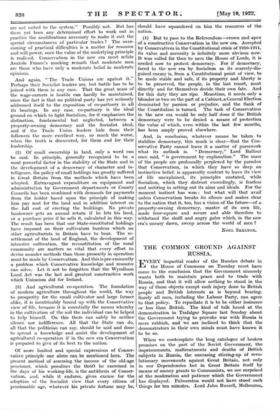CONSTRUCTIVE CONSERVATISM. IV.—DEMOCRACY STABILIZED.
IN the three preceding articles an attempt has been made to sketch the main features of the new era and to indicate the opportunity which opens to a con- structive Conservatism to solve the problem it presents. It remains to state as clearly as may be what means lie ready to develop a property-owning democracy, to bring the industrial and economic status of the wage-earner abreast of his political and educational, to make democracy stable and four-square.
These (to mention only subjects of the widest im- portance) are, it is submitted, four :—(1) for the wage- earner, whether in factory or in field, industrial co-part- nery, or its halfway house, profit-sharing ; (2) for the agriculturist, who seeks to become completely his own master, small ownership ; (3) for the rural world, as a whole, agricultural co-operation ; (4) for the community, to secure it against sudden assault, the Referendum.
One common principle underlies these proposals, making them a practical and accurate expression of the Conservative " view of life," for each, in its own way and in its own sphere, at once develops the character of the individual and the stability of the social structure. It may be objected that of these neither co-partnery and profit-sharing nor agricultural co-operation can success- fully be brought into operation by Act of Parliament, but must grow as the nation's understanding of them grows. So be it—all the more natural and essential it is that Conservatism should make these great topics its own : for they offer a means of economic, social and national progress which the State cannot dole out with a spoon. And if Conservatism fails to show the nation an alternative line of advance, it would have to bear the blame should the people come to the conclusion that the only way forward lay along the Socialist path, however desperate and perilous that might be.
(1) First, then, as to industrial co-par tnery. It rests on a firm basis of principle. Capital and Labour by it are to the full recognized as partners in the work of the pro- duction of wealth, for each shares in the true profits of that production, arrived at after each, the one by way of a fair rate of interest, the other by way of a fair wage, have been paid the price for its services in the common work. And further, the wage-earner's proportion of the profits is paid to him partly in cash, partly invested for him in the concern, while, as the workers become capitalists, " seats on the Board," either for the domestic internal government of the concern, or for its general direction, very naturally follow.
Thus status and property-owning grow together ; the wage-earner, as industrialist, from a machine becomes a man. Nor is this all. To the wage-camer, co-partnery brings a new incentive and a new kind of interest in his work, arising out of his new relation to it ; a union of his thrift effort and his work effort ; a wider industrial out- look, since, as his savings in the business increase, so does his interest in its general prosperity, for that pros- perity affects him directly as a shareholder.
To the community it brings all the results that flow from a real identification of interest between Capital and Labour—reduction of the number of strikes, with their waste of the national wealth and dislocation of the national life ; the elimination of such crazy doctrines as that of " ca' canny" ; improvement in the standard of both management and work, since the wage-earner will not readily submit to his own good work being neutralized by the slackness of his neighbour or the incompetence of his manager.
Yet there are objections, it is said. " Some industries. are not suited to the system." Possibly not. But has there yet been any determined effort to work out in practice the modifications necessary to make it suit the special circumstances of particular trades ? The over- coming of practical difficulties is a matter for resource and will-power, once the value of the underlying principle is realized. Conservatism in the new era must refute Anatole France's mocking remark that moderate men are those who have only a moderate belief in moderate opinions.
And again, " The Trade Unions are against it." Perhaps their Socialist leaders are, but battle has to be joined with them in any ease. That the great mass of the wage-earners is hostile can hardly be maintained, since the fact is that no political party has yet seriously addressed itself to the exposition of co-partnery in all its bearings. In any case, co-partnery is the ideal ground on which to fight Socialism, for it emphasizes the distinction, fundamental but neglected, between a property-owning democracy and the Socialist ideal, and if the Trade Union leaders hide from their followers the more excellent way, so much the worse, when the truth is discovered, for them and for their leadership.
(2) Of small ownership in land, only a word can be said. In principle, generally recognized to be a most powerful factor in the stability of the State and in the development of a democracy of character and in- telligence, the policy of small holdings has greatly suffered in Great Britain from the methods which have been adopted. Extravagant expenditure on equipment and administration by Government departments or County Councils has been combined with demands for payments from the holder based upon the principle of making him pay rent for the land and in addition interest on the full cost of erecting the buildings. No private landowner gets an annual return if he lets his land, or a purchase price if he sells it, calculated in this way. The result has been that our State-constituted holdings have imposed on their cultivators burdens which no other agriculturists. in Britain have to bear. The re- settlement of the land of England, the development of intensive cultivation, the reconstitution of the rural community are matters so vital that every effort to devise sounder methods than those presently in operation must be made by Conservatism. And this is pre-eminently a problem which Conservative knowledge and resource can solve. Let it not be forgotten that the Wyndham Land Act was the last and greatest constructive work which Unionism did for Ireland.
(3) And agricultural co-operation. The foundation of modern agriculture throughout the world, the way to prosperity for the small cultivator and large farmer alike, it is inextricably bound up with the Conservative view of life, because it is essentially the means whereby in the cultivation of the soil the individual can be helped to help himself. On this there can safely be neither silence nor indifference. All that the State can do, all that the politician can say, should be said and done to spread a knowledge and assist the development of agricultural co-operation if in the new era Conservatism is prepared to give of its best to the nation.
Of more limited and special expressions of Conser- vative principle one alone can be mentioned here. The present method of assessing the income of the old-age pensioner, which penalizes the thrift he exercised in the days of his working-life, is the antithesis of Conser- vatism, and, while it endures, gives excuse for the adoption of the Socialist view that every citizen of pensionable age, whatever his private fortune may be, should have squandered on him the resources of the nation.
(4) But to pass to the Referendum—crown and apex of a constructive Conservatism in the new era. Accepted by Conservatives in the. Constitutional crisis of 1910-1911, its value and necessity is infinitely more obvious now. It was called for then to save the House of Lords, it is needed now to protect democracy. For if democracy, faced in the new era by Socialism as its scarcely-dis- guised enemy is, from a Constitutional point of view, to be made stable and safe, if its property and liberty is to he preserved, the people, in the last resort, must directly and for themselves decide their own fate. And for this duty they are ripe. Meantime, it needs only a blunder or two on the part of a Cabinet, a General Election dominated by passion or prejudice, and the flank of the Constitution is turned. The t9S1r of Conservatism in the new era would be only half done if the British democracy were to be denied a means of protection the value of which, even within the last few months, has been amply proved elsewhere.
And, in conclusion, whatever means be taken to stabilize democracy, this much is clear—that the Con- servative Party cannot leave it a matter of guesswork what its outlook is. " Democracy," Lord Balfour once said, " is government by explanation." The mass of the people are profoundly perplexed by the paradox that Conservatism, in which they have so deep an instinctive belief, is apparently content to leave its view of life unexplained, its principles unstated, while Socialism, which they distrust exceedingly, is fearless and untiring in setting out its aims and ideals. For the moment instinct has won : but what will that avail unless Conservatism breaks its silence and makes clear to the nation that it, too, has a vision of the future—of a property-owning democracy, master of its own life, made four-square and secure and able therefore to withstand the shrill and angry gales which, in the new era's uneasy dawn, sweep across the world of men ?
NOEL SKELTON.











































 Previous page
Previous page